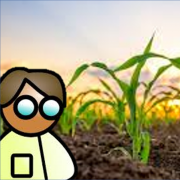Informational Interview with Professor Eve Wurtele, Iowa State University
Informational Interview by Seth O’Conner, ASPB Conviron Scholar 2018
Dr. Eve Wurtele is a professor in the GDCB department at Iowa State University. Her Bio is taken from her GDCB webpage (https://www.gdcb.iastate.edu/p…). I was fortunate enough to do a research rotation in Dr. Wurtele’s lab while I was at Iowa State, where my interest in orphan gene’s peaked. She is my PI’s old PI– which makes her my grand-PI– and her work to integrate experimental biology with bioinformatics has fueled research projects aiming to better understand the grey area (or “dark matter”) of the genome– orphan genes. I want to thank Dr. Wurtele for giving her time to answer these questions, and I hope everyone can in turn take the time to read them and learn a little bit from her.
Bio:
Dr. Wurtele’s research, juxtaposed at the interface between biology and computational sciences, centers on the interplay between the metabolic and regulatory signals: the metabolic network of plants. The Wurtele group is using an integrated experimental/biocomputational approach to understand the factors that regulate plant development and composition. This research is revealing a complex network that incorporates genes of previously unknown function that mediates the accumulation of proteins, starches and oils in plant leaves and seeds. Further, it has enhanced our understanding of the mechanisms of synthesis of unusual medicinal compounds. A practical consequence is that it provides new approaches to engineer plants, a biorenewable energy source, and microorganisms to accumulate large quantities of industrially-useful chemicals, and improve our food supply.
What brought you to plant science in the first place?
I was deciding between an art and a biology major, but then I just kept taking biology courses. At first I thought animal science was more interesting, but I hated killing little mice. So I switched to plants. And since then I have become fascinated by the complex biochemistry of plants and the many ways they must respond to their environment.
Did you do a post-doc? What did you take away from the experience?
Yep. I worked with a pioneer in biochemistry, Eric E Conn. He was a very kind man, and pretty much let me follow my interests. He also had his whole lab over for Thanksgiving. Being a postdoc was incredibly fun and exciting– so many new ideas and new people. I made a great group of friends and also met my husband there.
For a student looking into doing a post-doc, what advice would you give them while searching for a position? Is networking as important as research quality?
Networking is very important for a faculty position but much less so for industry. Networking is much easier for postdocs working with people who themselves are good at networking (which usually means being well-known). This is unfortunate, because being in a top name lab doesn’t always equate with top research. However, networking can also be done at conferences– it’s important at conferences to reach out to people you don’t yet know. Being in the lab of a famous scientist is very helpful in getting a job, because it “looks good” to many faculty members. (I honestly think this is one of the most unfair things about the hiring process.) One possibility is to choose two postdocs, and at least one of them in a top-name lab. Often for a faculty position, two postdocs will be needed. Also important– ask the members of the lab group (individually) what it is like working in that lab. For example, you may not want to go to a lab with a toxic atmosphere, everyone is competing against everyone else, or the prof is yelling at everyone. Not that this is typical, but it can happen, and I have several friends who left science because of it.
Your research has really transitioned into bioinformatics over your career, how important is it for all scientists (even bench scientists) to have a strong understanding of bioinformatics tools?
Because it can impact almost every aspect of research, it’s important to understand how applying bioinformatics can benefit your research. It’s impossible to understand everything, so if bioinformatics isn’t a passion, it’s important to understand some of the concepts, and also to develop close ties with others who are statisticians and computer scientists.
What do you enjoy the most about your job? Least?
Most is thinking and talking about the research, especially with my lab group and colleagues. I also love watching my students and postdocs learn and succeed. Least– two things. First the bureaucracy– so many rules and forms, and a constant barrage of new ones. Second, there can be a tremendous lack of imagination and courage among the upper administration.
I would not mind exploring different areas of research in a post-doc, how close should a student stay near their Ph.D. work when looking down the line?
Do what seems the most interesting- following your interests is best. Never be scared to change, that’s how you learn.
I believe you had a stint in Industry as a lead research scientist, what brought you back to academia? Do you prefer one or the other?
I prefer academia, because I love research, and I don’t want anyone telling me what to study, or when a project is “over” and the goals have shifted to another focus. I personally do my best with research freedom– I just need to figure out how to spin what I am doing to convince funding agencies and colleagues that it is worthwhile. That’s not always easy, but it’s interesting.
It seems important, regardless of our career stage, to maintain goals. What are some of your career goals for the future?
My goals focus on my research. I want to better understand the dark matter of the genomes. How much of evolution is enabled by new genes arising, and then dissipating.
Throughout your career, have you had a particular method of dealing with the pressure of your job? Or do you just thrive under it?!
I don’t like pressure. On the other hand, my proposals go better, and I guess truth be told it energizes me. One of my biggest pressures was juggling three kids and not-yet-tenure. I worked really hard to spend enough time with both. It meant almost no time for friends, which I regret, though I’d do it again the same way.
Do you have any other advice for young plant scientists like us?
Follow your nose!!! Lots of “truths” turn out to be incorrect. So think openly.
Other advice… learn from your colleagues about what research they are doing, read journal articles out of your immediate area, ask faculty and postdocs questions about their area of expertise (we love to answer questions). Call to ask advice of program officers before you apply for funding. Volunteer to be an officer of some program like Plant Biology. This gives you lots of insight, helps the program, and helps you network and head in a good trajectory!!
(I never had anyone to advise me, I wish I had! The above are things some people understand innately, but lots of us do not. Take advantage of the wonderful programs at your institutions and associations to help you teach, write good grants and papers, mentors, etc.)





Leave a Reply
Want to join the discussion?Feel free to contribute!